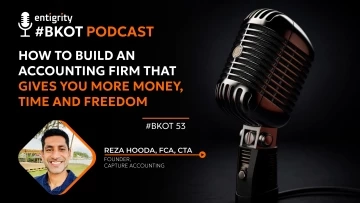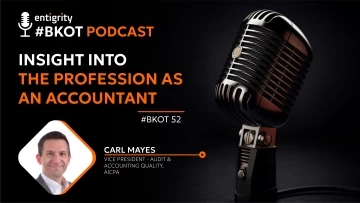In this episode of the BKOT podcast, Chris has discussed with Jerry Lotz, how cost segregation and cost reduction can be helpful to accountants, tax professionals to understand the calculations and file the returns.
#BKOT 43: BUILD A KICKASS OFFSHORE TEAM
COST SEGREGATION & COST REDUCTION FOR ACCOUNTANTS
Hosted by: Chris Rivera, Director Client relations, Entigrity Offshore Staffing
Guest: Jerry Lotz, Tax Planning Cost Reduction Energy Advisor
Transcript
Chris: Hi everyone, welcome and thanks for listening in today, we are continuing with our #BKOT series Build a kick-ass offshore team. So thanks for listening in everybody as we are continuing with our series of #BKOT Build a kickass offshore team and so the idea here is to have guest speakers and talk about how we can assist your firms with the whole staffing challenges going on with how to increase revenue with how to find different resources. And so for today we have Jerry Lotz with us. Jerry, how's it going?
Jerry: I am well it's Friday, right?
Chris: Yes, sure it is and Jerry thanks for taking time out and speaking to our audience today. Tell us a little bit about Jerry and also what are you doing on a day-to-day basis?
Jerry: Well Chris thank you so much for the opportunity. It’s funny I met one of the principles of Entigrity a few years back and kind of lost touch a little bit and then when you and I had reconnected, it's been good and I appreciate the opportunity to work with you and your team and help you to share the mission so it’s all good.
So when I was ending my years in medical sales careers I always had a passion for doing something on my own and I swore that when I did that I wanted to make sure that I put the guests together in what I would consider a group of best in class companies to represent. So I can sleep at night knowing that the few companies that I represent, always got my back. I was fascinated when I first heard, I started networking after I ended my medical sales career and I met some of the folks with the companies that I represent today.
And one of the companies is a company out of Baton Rouge, Louisiana called Cost Segregation Services Incorporated (CSSI for short). They are not an accounting firm but an engineering based company, but we work with accounting firms, tax professionals, CPA’s and their clients that have residential rental multi-family and commercial properties. So we actually go in and provide an engineering base study on a piece of property to reclassify the components that make up that property into shorter depreciation categories. So we do the calculations. We assume that liability for the tax professionals, give those calculations to the tax professional to apply to the return the tax professionals happy, their clients happy. It's a good thing to go ahead.
Chris: It's a win-win-win!!
Jerry: For sure, absolutely!
Chris: Yeah, can you talk a little bit about the background on cost segregation so for myself and the audience too, so can tell us a little bit about the history and how it works with accounting firms.
Jerry: Sure, so there have been a lot of I guess disputes or a lot of confrontation, controversy about assets in a building and what actually makes up that building? Well there's permanent assets and there are assets that may be considered personal property. So real property personal property and over the years you know this goes back probably 30 years ago there's been some controversy as to like the IRS says a commercial building you depreciate that over 39 year timeline, but everybody knows that the carpet in there is certainly not going to last 39 years there may be some decorative fixtures that won't last 39 years.
There were a couple of court cases and most historically most meaningful was a case back in the late 90s where the U.S court was there and there was a case where the IRS was battling against the hospital corporation of America and the court system ruled in favor of the hospital corporation of America to where they could actually reclassify, take their buildings and break them down and declare that certain things could depreciate more quickly than others. Well when that happened a number of the big four accounting forms jumped on the bandwagon and cost segregation was something that was finally put on the map and given a little bit of legitimacy with this court case.
So the big four accounting for firms jumped in and they wanted to put this out there for some of their largest clients which they did, it was an expensive proposition they did it for the clients that own the mega million types of buildings but ironically the attorney that represented hospital corporation of America contacted a guy named Jim Shreeve to look at this process now Jim's an engineer by trade. He also happens to be the president of CSSI, the company for whom I work.
He and Jim talked about bringing this process to an affordable level and allowing the steps that are in place to complete this process to make sense for everyday mom-and-pop types of building owners. So Jim helped to develop some of the protocol that's still in use today and it Jim went knocking door to door 20 some years ago and today the companies I am proud to say has done over 30,000 projects across every state and we can actually find value in buildings that are as low as two hundred thousand dollars, which is unheard of even today a lot of firms won't touch a property for less than a million or five hundred thousand dollars.
So it's exciting when I first heard that something like this even existed it just blew my mind and I thought wow! I have got to investigate this a little further so I hopped on a plane and went down to Baton Rouge and met the principal, met Jim and some of the folks in charge and they're just good people, they just they've got my back they've got our clients back I can call them anytime and you know if I don't know the answer to a question I can get on a three-way call with one of our folks with the client and the tax professional and bang we've got it locked down, so it’s a wonderful relationship.
Chris: And so yeah, that sounds like you're extremely happy with what you're doing and the company you work for and that's always a good sign. So now let's tie this in with the accounting firm aspect because the resources you provide are necessary and so is there specific you gave the one example by the other specific properties or is it all properties or kind of what's the best course of action for a CPA firm to reach out and regarding your help?
Jerry: So over the years there's been some misconceptions out there that you can only perform a cost segregation study on properties that are just newly acquired and that is far from the truth. So it certainly applies to whether a property is newly bought, newly built even if it's been owned a number of years there's still an opportunity to provide some tax savings.
Typically we would want to run studies or run estimates for CPA firms, for their clients that when they purchase property they intend to hold on to it, so somebody that's going to purchase and do a fix and flip sell it in a year two years ideally that is not necessarily the best candidate and most tax professionals would shy away from asking us to perform an estimate for that type of client just because when the client sells we are going to find a lot of tax deductions up front early on but as soon as that client sells that property in a year two years or whatever there is a certain amount of recapture that the client is going to have to pay.
So I guess when you consider the fees to get it done and the effort oftentimes you know the CPA’s will feel that you know if they're going to pay the recapture anyway, it may not be worth the effort but certainly anything that's going to be held for you know 3, 4, 5, 10 or 15 years is a great candidate for a cost segregation study.
And basically all types of properties can qualify. Now naturally in a shell of a warehouse we are going to find less assets that we can reclassify into either a five, seven or fifteen year class life than we would in a luxury hotel. A medical office probably is going to generate more accelerated depreciation than maybe a self-storage facility so certain buildings typically lend themselves to generating more dollars percentage-wise in relation to the size of the value of that building.
Chris: Got it and so in working with firms has there been so many changing laws and regulations and over the last couple years has any of the new tax laws affected your business or been able to provide further insight in working with CPA firms?
Jerry: It’s funny, there have really been two three tax laws that have kind of changed the playing field. The tangible property regulations of 2014 was probably the biggest change in tax laws since 1986 then the 2017 tax cut and job act was a huge change and even the 2020 the cares act was another huge change that and the combination of three of them together really took cost segregation to another level.
When I first started doing this about six years ago, I set up a google alert on my phone that whenever there was an article published on the internet that had anything to do with cost segregation it would ping me so that I could see what that article was entailing.
Well I may have seen I don't know a couple of months and now nearly every day or at least three times a week there's something that's published specifically to cost segregation so it is becoming more mainstream more folks are knowing about it more tax professionals are learning that it's valid, it's legitimate, it truly brings tax savings.
One of the big misconceptions that were out there were if it ain't broke don't fix it if I do this it's going to cause an IRS audit so these three tax laws that I mentioned really kind of elevate the importance of cost segregation studies and the 2014 tangible property regulations actually has a piece in there that talks about tax professionals and their building owners needing to what they call scrub and depreciation schedule. So by that they mean to look at depreciation schedules for build clients that own buildings and I will just read a quick section from the tax code it's section 1.101 1016-3 says “Should the government audit your client find that you have not gone back and scrubbed depreciation schedules and if the service finds assets on the schedule that should have been expensed under the final regulations, it cannot only deny your ability to expense that item but it can disallow you from even continuing to depreciate that item” that's really powerful because not only is now cost segregation and scrubbing these depreciation schedules it can be a money-saving tax saving venture, it's a compliance venture because you got to comply with these laws now it really becomes a legal initiative. You've got to make sure that you're abiding by these laws or there potentially can be consequences.
So that I think is why the tax cut and job act really created a stir and helped to put cost segregation in the forefront. There are opportunities in that to go back and scrub schedules and find things that may have been entered six seven years ago correctly as a capitalized item and now when you take that initiative or that expenditure and match it up against these new regulations that dollar amount can be reversed and now can be expensed because the laws have changed so that creates significant catch-up depreciation allowances in that regard.
The 2017-18 Tax Cut and Job Act basically said that any assets that we can reclassify into a class life that is less than 20 years, so all the five-year assets like carpets countertops, decorative fixtures and a host of others, all the 15-year assets, a lot of the site utilities paving even the lines on the parking lot you can place a value on those and all those 5, 7 and 15-year assets can be written off at 100% in the first year of ownership.
I will never forget when that law came into place one of the first studies that I was able to do was for a gentleman who owned a number of Dunkin Donuts facilities. So these are fast food drive-through types of facilities all over the country and this gentleman owned about 12 of them well he's looking at an income for the year of about $8,00,000 and looking for any way that he can to come up with ways to reduce his tax liability on $8,00,000 that same year he spends about a million building another facility, beautiful state-of-the-art equipment, drive-throughs canopies, beautiful parking lot of that millionaire show that he spent in doing that we were able to reclassify five six hundred thousand dollars worth of assets into a category that he could write off in that first year. So now he's not paying taxes on $8,00,000 he's only paying taxes on a couple hundred thousand dollars right that's huge.
Chris: Yeah, well the cost savings that you provide especially with buildings and rent going up I mean any way to save money and help out the client is the end result here so before we wrap up, appreciate you sharing some insight into this. How can we get a meeting set up with you and how can we get a hold of you?
Jerry: Oh okay, well my name's Jerry Lotz, my telephone number area code 410-960-8269, you can contact me via my website as well www.costseges.com, i.e Cost Seg Energy Solutions dot com.
Chris: Perfect, Jerry, really thank you for your time today and giving us some insight here. You obviously know what you're doing and how to talk about it, how to help clients so folks listening in reach out and for now Jerry we really appreciate it and we'll take care.
Jerry: Thank You sir and always enjoy working with you, take care bye.
Entigrity™ is a trusted offshore staffing partner to over 600+ accountants, CPAs, and tax firms across the US and Canada. Our flexible and transparent hiring model helps firms of all sizes hire staff for accounting, bookkeeping, tax preparation, or any other task for 75% less cost. As a firm 'run by accountants, for the accountants', Entigrity captures the hiring needs of accounting firms most precisely, providing staff that works directly under your control and management, still, you are left with least to worry about compliance, payroll taxes, overheads or any other benefits.

_1642676318-1686039629.webp)



